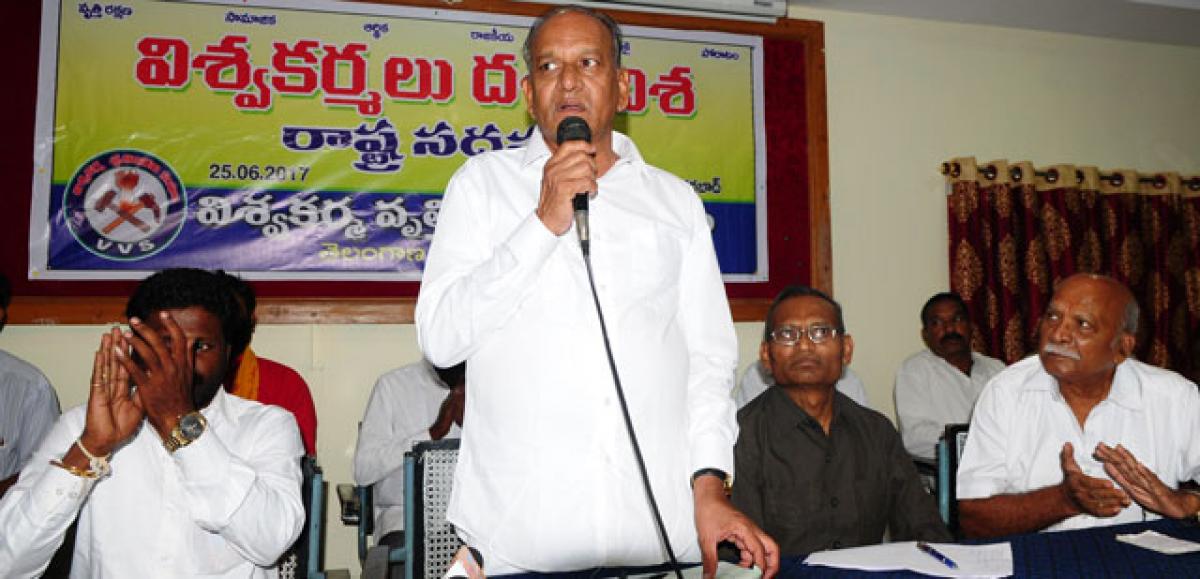Live
- India’s banking sector poised for continued resilience: S&P Global
- Prabhas Expresses Gratitude to Fans and Apologizes for Missing Japan Visit
- Prime Video Unveils New O Womaniya! 2024 Report Highlighting Gaps in Female Representation in Indian Entertainment
- A Cosplayers Full House
- Amit Shah lauds Chhattisgarh govt for action against Maoists
- Four of a family killed in road accident in Bengal’s Cooch Behar
- Israel continues airstrikes across Syria, targeting military arsenals
- 2024 round-up: Govt completes disinvestment of Ferro Scrap Nigam, GIC Re offer for sale
- Allu Arjun's Pushpa 2 Sees Surge in Ticket Occupancy After Arrest Incident, Breaks Box Office Records
- Best Budget-Friendly 50-Inch Smart TVs of 2024
Just In

The Vishwakarmas, who contributed greatly to the Indian civilization and culture and played a vital role in the village economy have been looking for immediate help from the government as the community lost their livelihood following economic and technological forces buffeting their profession to extinction.
Hyderabad: The Vishwakarmas, who contributed greatly to the Indian civilization and culture and played a vital role in the village economy have been looking for immediate help from the government as the community lost their livelihood following economic and technological forces buffeting their profession to extinction. The Vishwakarmas are engaged in the oldest form of traditional occupations such as carpentry, goldsmith, kanchari and stapathis.
Though the government has assured earlier that it would extend financial assistance and provide modern tools to artisans belonging to the Vishwakarmas, so far no steps have been taken in that direction. The community, which comprises roughly 9 per cent of the total population in Telangana, still depends on the traditional occupations in the villages to eke out a living.
“I enjoyed handful of work by getting plenty of orders from farmers to manufacture ploughs and other farm-related equipment till early 2000. Now, my family hardly earns Rs 30,000 per year,” bemoans K Ranga Chary from Mahbubnagar. He is struggling hard to provide even a square meal a day to his family.
Providing reasonably good education to children is a distant dream, he said. The carpentry has lost its importance with modernization. People of villages who earlier used to get chairs, tables and other furniture made by local carpenters are now opting for readymade furniture from towns. As a result, the community people are forced to migrate to towns as workers in furniture manufacturing companies, Ranga Chary said.
Those who migrated to the cities are somehow able to provide basic education to their children but those in villages are turning into daily wagers and are surviving with great difficulty. Even to find a match for their children is an impossible task, says Ranga Chary. Rallabandi Kumaraswamy from the Viswakarma State Federation said the state has a population of about 10 lakh Viswakarmas practising Kammari (blacksmith), Vadrangi (carpenter), Kanchari (bronze article makers) and Kamsali (goldsmith).
The entire lifecycle and survival of the communities had always been around the agrarian economy in the villages or they were patronized by the kings and religious institutions. With the government not coming to their rescue, they are now facing life of penury, he added. Y Naga Chary from Bhongir said the traditional goldsmiths have become outdated as sophisticated jewellery shops have flooded the market.
Not being familiar with modern technology, the traditional goldsmith work is on the verge of extinction in the state, he rued. “So far the Telangana government has not come up even with a single specific welfare programme for our welfare,” he said. The Kammaris who used to play key role in making agriculture implements, axles and axle parts for bullock carts, agriculture implements ahead of the agriculture operations every year have now become workers in shops making grills etc used in the construction of housing.
People from the Kanchari too have unique place in Telangana with the tradition of manufacturing of Pembarthy brassware. The tradition goes back to the Nizam rule, when the artisans made different articles like boxes to keep perfumes, betel leaf, soaps, cooking utensils of brass and silver, religious idols, bells, ornamental and traditional lamps and mementos. With no support from the government and being in unorganized sector and lack of marketing support from the government, they are struggling to earn a living.
The Silpis or sculptors who used make idols for temples and were engaged in temple construction are in no better condition. A good number of them from Telangana are virtually working on small jobs in the works taken up by temple administrations like the TTD and Srikalahasti Devasthanams in Chittoor district as well as in some temples in Tamil Nadu.
By VRC Phaniharan

© 2024 Hyderabad Media House Limited/The Hans India. All rights reserved. Powered by hocalwire.com







